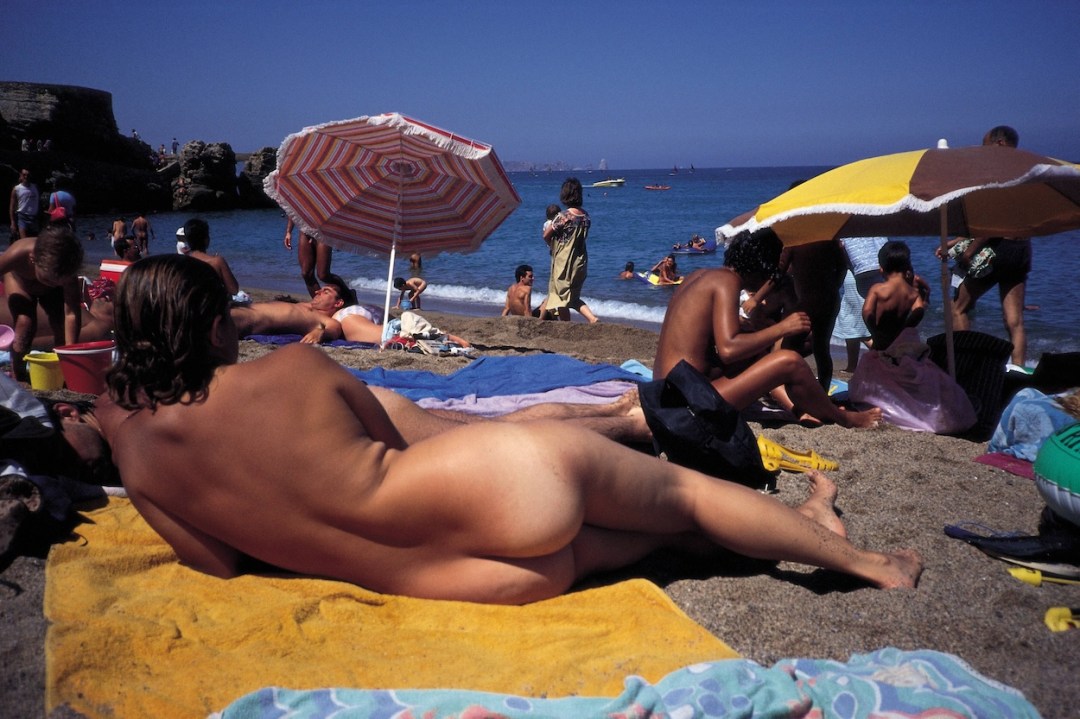Homer is much praised, but I find him unreliable. The Mediterranean cove in which we were swimming, for example, was not in the least wine-dark. We were turning around and swimming back, the sights on display at the nudist end of the beach having startled the spluttering elegance of my head-above-water breast-stroke.
‘I wouldn’t mind if it was only young women,’ I said to my wife, as we swam back. Rather than accepting my dispassionate nod toward prevailing cultural aesthetics, she replied she didn’t mind in the slightest, and couldn’t see the harm. An unspoken charge of puritanism hung in the air. ‘It was just a bit too much like an outpatient clinic,’ I said, and good-humoured sympathy swung back in my favour. ‘Yes,’ she agreed, also a veteran of long hours spent examining the exposed bodies of the ageing, the infirm and the worried well, ‘too much human.’
Henry James, after meeting George Eliot, wrote to his father that she was ‘magnificently ugly – deliciously hideous. She has a low forehead, a dull grey eye, a vast pendulous nose, a huge mouth, full of uneven teeth and a chin and jaw-bone qui n’en finissent pas.’ Yet James had an eye for character, and Eliot’s was immense. ‘So that you end as I ended, in falling in love with her,’ he continued, ‘a delightful expression, a voice soft and rich as that of a counselling angel – a mingled sagacity and sweetness – a broad hint of a great underlying world of reserve, knowledge, pride and power – a great feminine dignity and character in these massively plain features.’
Love makes us beautiful in each other’s eyes – or perhaps seeing the beauty in each other prompts us to love. But for strangers, who have flashed not their character but only their unexpected genitals, I feel no immediate fondness. And among the variety of human forms, many are unknown to the more sought-after branches of aesthetics. There is ugliness that only Goya can make beautiful.
Letting it all hang out has never seemed an attractive rule for life. Discretion seems a better ambition. Pettiness, irritations and ill-considered prejudices are best kept hidden. Even hopes and loves and dreams are best exposed judiciously, and the same is true of flesh. Manners and thoughtfulness are as essential as clothes. Private life requires privacy and nudity should rarely arrive in one’s life unrequested.
Decades ago, a friend held his stag weekend in Madrid. He had some excuse for this, beyond the attractions of the city, since his fiancée was Spanish. He explained to her some of the traditions of British stag weekends, and that he felt a moral obligation to provide the sight of female flesh to his friends. She suggested we all went swimming one afternoon in an outdoor pool, where the normal Spanish presence of topless sunbathers would tick the box. They ignored us as much as we did them, and the debt to vulgar tradition was paid. Without a grim late-night visit to a strip club – an experience high on my list of those I plan to die without – I rose the next morning sufficiently fresh to visit the Prado. The Goyas were marvellous.
Letting it all hang out has never seemed an attractive rule for life
I cannot find it in my heart to be glad that strip clubs exist – some things cross the line from bad taste to irretrievably mistaken – but that nude beaches continue to thrive gladdens my sour heart. De gustibus non est disputandum, goes the proverb; there’s no arguing about taste. Yet was it Nietzsche – not a known authority on public nudity – who responded that life is nothing but an endlessly fascinating argument about taste? Something to it, I suspect.
It is a cliché to say that life would be dull if we were all the same; a truism that the danger of this coming to pass is reassuringly low. Gerard Manley Hopkins’s ‘Pied Beauty’ praised variety:
Glory be to God for dappled things –
For skies of couple-colour as a brinded cow;
For rose-moles all in stipple upon trout that swim;
Like Nietzsche, possibly Hopkins wasn’t thinking of nudist beaches specifically. But variety in our tastes and our choices is the stuff of life. ‘For what do we live, but to make sport for our neighbours,’ says Jane Austen’s Mr Bennet, ‘and laugh at them in our turn?’ That there exist people whose idea of a good time is taking off their clothes to get sun on their genitals and sand in their crevices is worth celebrating. Ideally, from a distance.








Comments